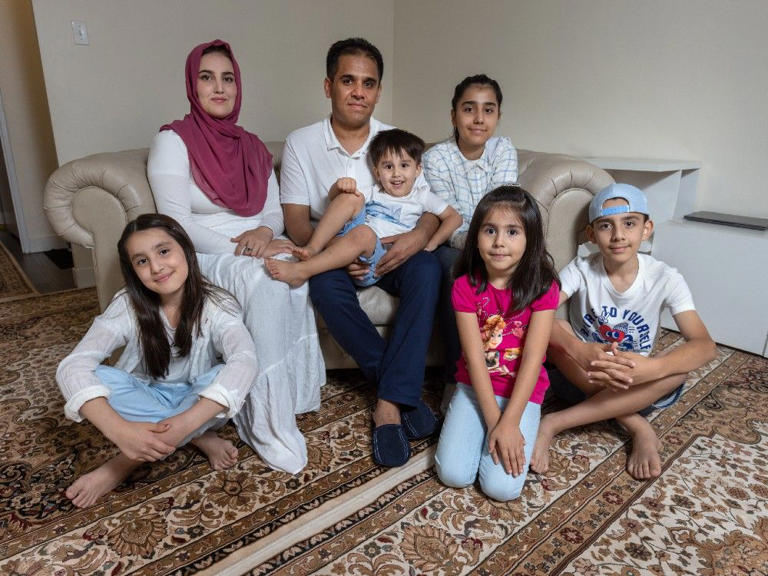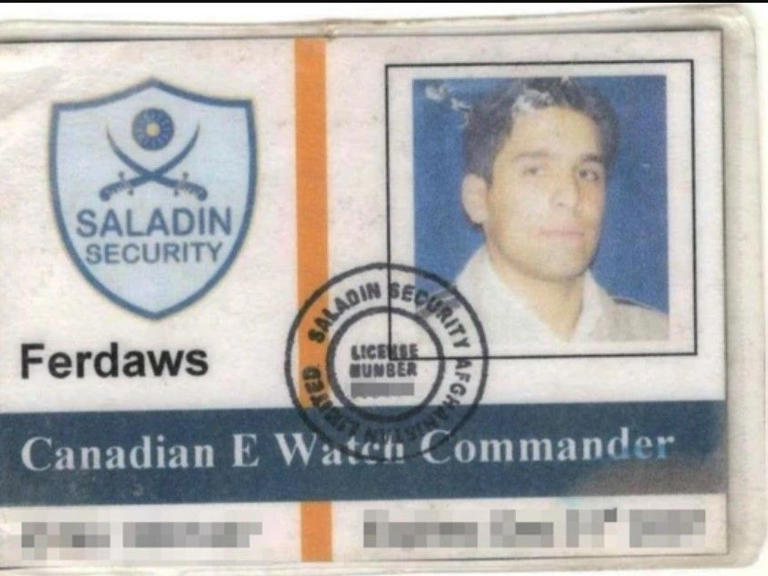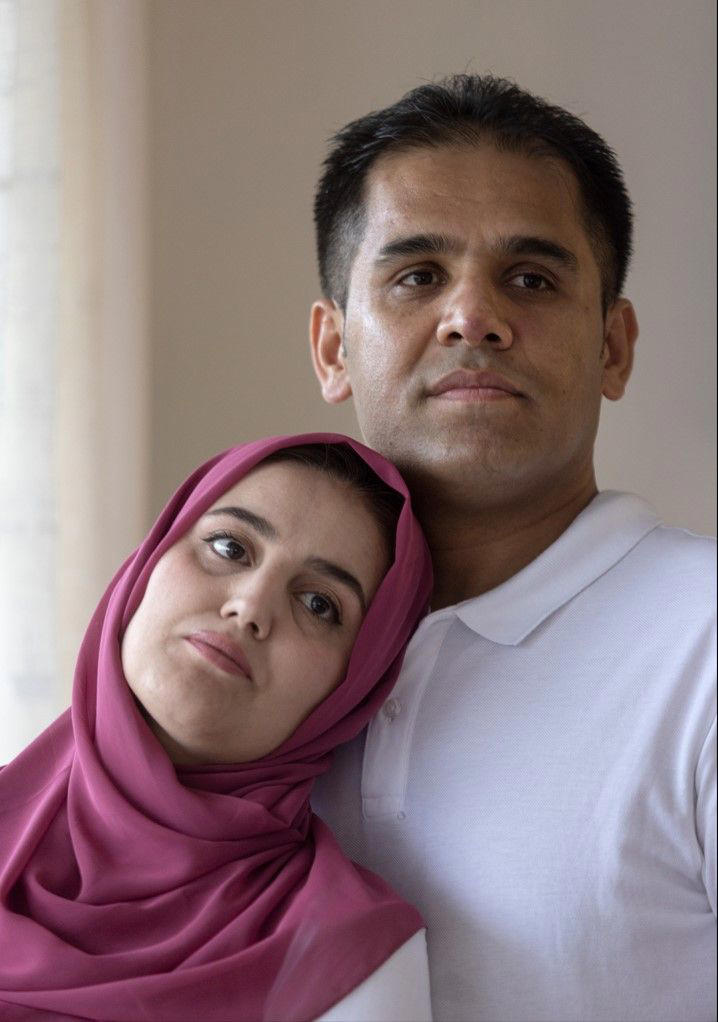Story by Bryan Passifiume • NATIONAL POST

The Rahimi family (FROM LEFT TO RIGHT) Zahara (DAUGHTER), Farida (MOTHER) Omar (SON BEING HELD) by Ahmad Rahimi (FATHER), Marwa (DAUGHTER), Iqra (DAUGHTER) and Ahmad Fakher (SON) at their Mississauga home, who escaped the Taliban in Afghanistan where he was a security head for Canada’s embassy in Kabul.© Provided by National Post
When Canada put out the call for help during their 14-year mission in Afghanistan, Ahmad Ferdaws Rahimi was among the thousands of Afghan nationals who lent a hand.
And when Canada announced their limited efforts to evacuate them ahead of the Taliban’s surprise 2021 return, he was among those left behind.
Now living in Mississauga, the story of the Rahimi’s escape from Kabul highlights the problems with Canada’s lamentable evacuation of its people from the country, but also the importance of maintaining hope.
“We are so happy because we are here, we are safe,” he told the National Post.
“In Afghanistan it was big trouble for us, especially for me, because I was working with foreigners.”
Local interpreters, security personnel and embassy workers were the unsung heroes of Canada’s 14-year Afghanistan mission.
Rahimi served as a watch commander for contracted security forces at Canada’s diplomatic mission in Kabul, acted as an adviser to the Canadian Forces’ Operation ARGUS advisory team, and performed security work for the Germans at their embassy.

The Rahimi family (FROM LEFT TO RIGHT) Zahara (DAUGHTER), Farida (MOTHER) Omar (SON BEING HELD) by Ahmad Rahimi (FATHER), Marwa (DAUGHTER), Iqra (DAUGHTER) and Ahmad Fakher (SON) at their Mississauga home, who escaped the Taliban in Afghanistan where he was a security head for Canada’s embassy in Kabul.© Provided by National Post
When Canada put out the call for help during their 14-year mission in Afghanistan, Ahmad Ferdaws Rahimi was among the thousands of Afghan nationals who lent a hand.
And when Canada announced their limited efforts to evacuate them ahead of the Taliban’s surprise 2021 return, he was among those left behind.
Now living in Mississauga, the story of the Rahimi’s escape from Kabul highlights the problems with Canada’s lamentable evacuation of its people from the country, but also the importance of maintaining hope.
“We are so happy because we are here, we are safe,” he told the National Post.
“In Afghanistan it was big trouble for us, especially for me, because I was working with foreigners.”
Local interpreters, security personnel and embassy workers were the unsung heroes of Canada’s 14-year Afghanistan mission.
Rahimi served as a watch commander for contracted security forces at Canada’s diplomatic mission in Kabul, acted as an adviser to the Canadian Forces’ Operation ARGUS advisory team, and performed security work for the Germans at their embassy.
He also managed security for Afghanistan’s largest private airline, Kam Air.
Those jobs landed Rahimi on a Taliban hit list, culminating in a 2019 attempt on his life involving armed gunmen opening fire as he stopped to buy food on his way home from work.

ID card for Ahmad Rahimi when he was employed at Canada’s embassy in Kabul.© Courtesy Ahmad Rahimi
As the Taliban continued their march towards Kabul during the summer of 2021, members of the sect reportedly conducted door-to-door searches for those who gave aid to the allies.
That prompted Rahimi to start seeking an exit plan — and he turned to Canada for help.
Instead of freedom, Rahimi, wife Farida, and their five children found themselves among the hundreds of would-be evacuees who found themselves mired in the bureaucracy of both Immigration, Refugees and Citizenship Canada (IRCC) and Global Affairs Canada (GAC) — waiting for one final email that would’ve secured space on one of the evacuation flights Canada and allies were staging at Kabul’s besieged airport.
While nations such as the U.K. and Germany ran armed patrols to evacuate their citizens and workers using helicopters and even European-plated buses to move people into the airport, Global Affairs Canada told evacuees to “wear red clothing” and present themselves to officials at a hotel on the airport’s perimeter.
Word of these directives made their way to the Taliban, who reportedly unleashed beatings at anybody who showed up at the gate wearing red clothing.
Those who did make it to the airport’s notorious north gate were turned away by both Afghan and Canadian soldiers — even those with valid documents allowing them passage on Canadian flights.
Rahimi’s email from Global Affairs never arrived, leaving the family to fend for themselves.
He was comforting his then-baby son Omar when they were accosted by a Taliban thug, calling him a “foreign servant” before unleashing a brutal beating.
“I tried to put myself between him and my wife and children,” Rahimi told the Toronto Sun from Kabul in 2021.
Related video: Afghan interpreter shares long struggle to bring his family to Canada (cbc.ca)Duration 2:01 View on Watch
“If I had allowed, he would have killed us.”

Four of Ahmad Rahimi’s five children in the back of an Royal Air Force A-400 cargo plane, just arrived in Dubai from Kabul, on Aug. 21 2021.© Courtesy Ahmad Ferdas Rahimi
This was witnessed by a passing Royal Air Force officer, who took pity on the family and ushered them through the gate.
Rahimi’s previous work for a U.K. contractor was enough to get his family aboard a British evacuation flight while Canadian officials sorted things out.
After some time in London , the Rahimis were eventually allowed to emigrate to Canada.
Rahimi got a job with the Ontario government, and managed to secure a small three-bedroom rental apartment in Mississauga — thanks to a kind-hearted refugee advocate who allowed Rahimi to use her as a guarantor.
“If we were stuck in Afghanistan, there would be no opportunities for my daughters to go to school,” he said, adding that his 14-year-old daughter Marwa — who started attending high school this week — has aspirations of becoming a doctor.
“I’m glad for my children — because they are living here, they have futures. They will be educated.”
While he’s beyond happy at their shot at a safe and fruitful life in Canada, life here hasn’t been without its challenges — particularly surrounding affordability.
“Rent is very high, like 70 per cent of our income,” he explained, saying they pay nearly $2,700 per month to rent their three-bedroom apartment.
The high cost of living have all but extinguished Rahimi’s hopes of owning a home in Canada.
Registering his children for school was also a challenge, he said — but he was pleasantly surprised at how quickly his kids managed to pick up English, saying that even his two-year-old son Omar has started using English words.

Farida Rahimi and husband Ahmad Rahimi in Mississauga, Ont. on Wednesday, Aug. 30 2023.© Peter J. Thompson
His wife, while fluent in six languages, is having a harder time learning English — something that Canadian Forces veteran and evacuee advocate Amanda Moddejonge said is common.
“There’s a particular saying that I laugh at every time I hear it — it’s ‘happy wife, happy life,'” she said.
“If you can find a way to make your wife just a little bit happier here, the entire family could adjust easier — but the families where the wife doesn’t speak English, they’re having a difficult time adjusting.”
That, she said, is thanks to a lack of government support for evacuees once landing in Canada, who were largely left to underfunded community support services to provide language training.
Many families, Moddejonge said, are also dealing with broken family bonds.
Those fortunate enough to escape almost always left loved ones behind, many living in hiding.
Rahimi says his brothers managed to flee to Iran and Pakistan, while his elderly father remains in Afghanistan in poor health.
His wife Farida is currently dealing with the recent death of her father, also left behind two years ago.
This remains a very real problem for evacuees, says retired CAF veteran Robin Rickards, who spent years securing safe passage for the Afghan national who served alongside him as an interpreter for Canada.
“The people that have come to Canada are burdened with survivor’s guilt,” Rickards said.
To this day, Rickards, Moddejonge and those who managed to flee to Canada are still inundated with cries of help from those left behind.
“That’s the burden that these families are struggling with, and to some degree there’s an expectation — either spoken or unspoken — that refugees should be grateful for what Canada gives them,” Rickards said.
“But it’s easy to see the way Canada is treating people that worked for us could lead to resentment.”
This was the consequence, he said, of Canada’s government of treating the evacuation — which occurred on the same day Prime Minister Justin Trudeau dissolved parliament ahead of that fall’s federal election — as a political issue rather than a humanitarian one.
“This is the consequence of the government’s failed policy.”
• Email: bpassifiume@postmedia.com | Twitter: @bryanpassifiume
No comments:
Post a Comment